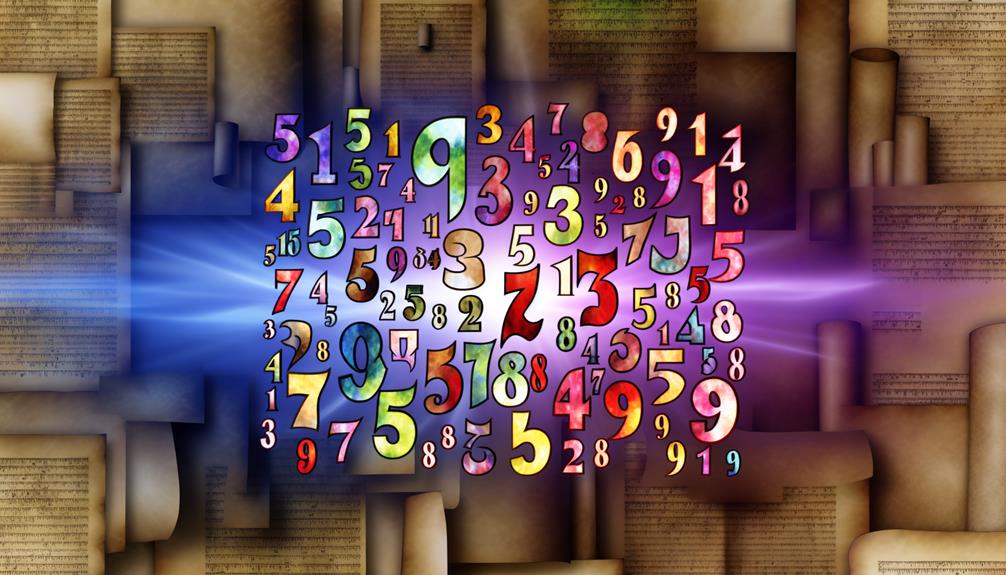558 Meaning in the Bible: Divine Guidance
The number 558, while not explicitly mentioned in the Bible, can be interpreted through its composite digits: 5 signifies God’s grace and 8 symbolizes new beginnings and resurrection. This combination emphasizes renewal through divine grace, reflecting broader theological themes seen in scriptures like the resurrection on the eighth day (John 20:1) and grace in the Pentateuch.
Hebrew numerology, or gematria, often infuses such numbers with spiritual significance, compelling deeper exploration of biblical texts and historical contexts for fuller understanding. Additional research into biblical numerology could unfold more intricate dimensions of these symbolic meanings.

558 Meaning in the Bible: Divine Significance, Numerology, and Spiritual Guidance
| Aspect | Meaning |
|---|---|
| Numerology Significance | 558 blends the energies of 5 (freedom, grace, and divine favor) and 8 (abundance, authority, and new beginnings). It signifies a harmonious balance between personal growth and spiritual purpose. |
| Biblical Context | Represents God’s blessings and encouragement to embrace change while staying faithful. It suggests divine provision and guidance in moments of transition. |
| Spiritual Insight | Encourages individuals to align their faith with action, trusting God’s timing and embracing opportunities for growth and abundance. |
| Symbolism | Reflects renewal, personal empowerment through faith, and the infinite possibilities God has planned. A reminder to trust divine wisdom and take steps forward. |
| Message for Believers | A call to focus on spiritual and material balance, emphasizing trust in God’s plan for prosperity and growth. |
Historical Context of 558

In examining the historical context of the number 558 within the Bible, one must explore the numerological significance and scriptural references that have shaped its interpretation over centuries.
The Bible, rich in symbolic numerology, does not explicitly mention 558, yet its composite numbers can be dissected for theological insights. The number 5 often symbolizes God’s grace, while 8 signifies new beginnings or resurrection.
Historically, biblical scholars investigate the cultural and religious settings of ancient texts to uncover layers of meaning. For instance, the Pentateuch (first five books of the Bible) and the resurrection account on the eighth day both highlight the thematic relevance of grace and renewal.
These elements collectively enrich the broader scriptural narrative surrounding 558.
Symbolism in Biblical Texts

Symbolism in biblical texts serves as a profound vehicle for conveying theological truths and spiritual principles, often embedding deeper meanings within the narrative structure and literary devices. Scriptural symbols such as the lamb (John 1:29), representing Jesus Christ as the sacrificial offering, and the serpent (Genesis 3:1), denoting deception and sin, are pivotal for theological interpretation. Historical contexts enrich these symbols, revealing their layered significance across different eras and cultures.
| Symbol | Scriptural Reference | Meaning |
|---|---|---|
| Lamb | John 1:29 | Jesus as the sacrificial offering |
| Serpent | Genesis 3:1 | Deception and sin |
| Olive Branch | Genesis 8:11 | Peace and reconciliation |
| Dove | Matthew 3:16 | Holy Spirit |
| Bread | John 6:35 | Sustenance and life |
These symbols guide readers toward a deeper understanding of biblical narratives and the divine messages within.
558 in Hebrew Numerology

In Hebrew numerology, or gematria, the number 558 carries a distinct symbolic significance that can be unpacked through its individual components and their scriptural contexts.
By examining the numeric values of the Hebrew letters and their appearances in sacred texts, one can uncover deeper spiritual implications and historical meanings.
For instance, the combination of numbers associated with 558 may reflect themes of divine grace and transformation, as seen in various biblical narratives.
Hebrew Numbers Interpretation
Hebrew numerology, deeply rooted in Jewish mystical traditions, assigns profound symbolic significance to numbers, with the number 558 offering a unique lens through which to explore scriptural and historical narratives.
This interpretive framework, known as Gematria, connects numerical values to Hebrew letters, revealing hidden meanings within sacred texts.
For example, the number 7, often associated with divine perfection, frequently appears in biblical contexts, while 40 symbolizes periods of trial and transformation, as seen in the Israelite wanderings and Jesus’ temptation in the wilderness.
Interpreting numbers like 558 within this tradition requires an understanding of their foundational spiritual and historical contexts, enriching our comprehension of biblical passages and their underlying messages.
This method reveals deeper layers of meaning, fostering a holistic engagement with scripture.
Symbolic Significance of 558
How does the number 558, when analyzed through the lens of Hebrew numerology, reveal profound insights into biblical narratives and their underlying spiritual messages?
Delving into the symbolic significance of 558, we find that each digit carries weighty connotations. In Hebrew, numbers often correspond to specific letters and words, embedding deeper meanings in scriptural texts. The number 5 (ה) symbolizes God’s grace, while 8 (ח) denotes new beginnings and eternal life.
Combined, 558 can be interpreted as a divine message emphasizing renewal through grace.
Historically, numerological interpretations have enriched biblical exegesis, offering layered understandings. Instances in the Torah and prophetic books subtly incorporate numerical symbolism, enhancing the spiritual and theological dimensions of the sacred writings.
Spiritual Implications in Scripture
Exploring the spiritual implications of Hebrew numerology in scripture reveals a complex interplay between numerical values and theological concepts, profoundly enriching our understanding of biblical texts.
Hebrew numerology, or gematria, assigns specific numerical values to Hebrew letters, which can disclose deeper meanings within sacred texts.
For instance, the number 558, represented by the letters ‘nun,’ ‘chet,’ and ‘tet,’ invites scholarly contemplation on its symbolism. Scriptural references, such as Psalm 119, illustrate how these numerical values can influence interpretative layers.
Historically, rabbinic traditions have utilized numerology to decode divine messages, reflecting a time-honored method of exegesis.
Consequently, Hebrew numerology not only provides a quantitative analysis but also offers a qualitative spiritual insight, bridging the finite and the infinite in biblical hermeneutics.
Theological Interpretations

Theological interpretations of the number 558 in biblical numerology often uncover profound symbolic messages embedded within Scripture.
Historically, numbers in the Bible frequently carry deeper meanings, such as the number 40 symbolizing trials (e.g., Jesus’ 40 days in the wilderness) and 7 representing divine completeness (e.g., the seven days of creation).
These symbolic interpretations provide a framework for understanding how the number 558 may reflect broader theological themes and divine principles within the biblical narrative.
Numerology in Scripture
In the domain of biblical numerology, the number 558 is often examined through its scriptural occurrences and theological implications, shedding light on its symbolic resonance within the sacred texts. Scholars seek to decode its significance by analyzing key aspects:
Scriptural References: Instances where the number appears in biblical passages.
Theological Context: Interpretations by early Church Fathers and contemporary theologians.
Historical Background: The cultural and historical setting of the biblical texts mentioning 558.
Symbolic Meaning: The number’s potential to symbolize divine completeness or judgment.
Symbolic Biblical Messages
Often, symbolic biblical messages are interwoven with theological narratives, providing profound insights into divine intentions and human experiences as interpreted through scripture.
Symbols such as the lamb in John 1:29, representing Jesus as the sacrificial Lamb of God, encapsulate theological depth, signifying redemption and atonement.
Historical contexts, like the Exodus, use symbols such as the Passover lamb (Exodus 12:21-27) to convey deliverance and covenant.
The serpent in Genesis 3 symbolizes temptation and sin, while its counterpart in Numbers 21:9 symbolizes healing and salvation.
These symbolic elements bridge human understanding with divine revelation, offering layers of meaning that theologians and scholars continue to explore, ensuring that the biblical text remains a rich source of spiritual and moral guidance.
Notable Biblical References

Why does the number 558 hold such significance in the Bible, and what are the notable scriptural references that illuminate its meaning within a historical and theological context?
Examining this number reveals profound insights into divine messages and human experiences. Biblical references to 558 can be explored in various contexts: Examining this number reveals profound insights into divine messages and human experiences. Biblical references to 558 can be explored in various contexts: it signifies the importance of divine guidance and the interconnectedness of life events. Furthermore, when considering the 640 biblical meaning of blessings, one can discern how blessings often manifest through both trials and triumphs, ultimately leading individuals to a deeper understanding of their purpose and the benevolence of the divine. Thus, the journey through numbers like 558 and 640 enriches our spiritual awareness and highlights the sacred messages woven into our daily lives.
- Genealogies: Chronicles and genealogies often mention specific numbers, elucidating family lines and historical continuity.
- Prophetic Visions: Prophetic books may use numbers symbolically, revealing deeper spiritual truths and future events.
- Covenantal Promises: Numbers can signify covenants between God and His people, reflecting divine faithfulness and human obligations.
- Numerical Symbolism: The use of numbers in apocalyptic literature provides symbolic meanings that transcend literal interpretations.
These references collectively offer a rich tapestry of theological and historical significance, inviting deeper contemplation.
Comparative Analysis With Other Numbers

To understand the significance of the number 558 within the Bible, it is essential to compare it with other biblically significant numbers such as 7, 12, and 40, which are rich with symbolic meanings and historical contexts.
The number 7, often seen as the number of perfection, is exemplified in the creation account (Genesis 1).
The number 12 represents completeness regarding governance, as seen with the twelve tribes of Israel (Genesis 49).
The number 40 symbolizes periods of testing and transformation, as illustrated by the 40 years the Israelites spent in the wilderness (Exodus 16).
Modern Spiritual Insights

Exploring the number 558 through the lens of modern spiritual insights necessitates examining its potential symbolism and relevance within contemporary theological discourse and scriptural interpretation. In scriptural numerology, numbers often carry significant meaning, prompting scholars to investigate 558’s deeper connotations.
- Numerological Significance: In biblical terms, the number 5 often symbolizes grace, while 8 represents new beginnings. As a result, 558 may suggest a period of grace leading to renewal.
- Historical Context: Analyzing ancient texts and their historical settings can offer insights into how numbers like 558 were perceived by early believers.
- Scriptural References: Although 558 is not directly mentioned in the Bible, exploring its components (5 and 8) can yield interpretative value.
- Theological Implications: Modern spirituality may interpret 558 as a divine message encouraging transformation and hope.
Conclusion
The number 558, when examined through the prisms of historical context, Hebrew numerology, and theological interpretation, emerges as a multifaceted symbol within biblical texts.
Its intricate layers, comparable to the enigmatic codes in Revelation, reveal profound insights into divine order and spiritual significance.
By juxtaposing it with other biblical numbers, a deeper understanding unfolds, offering contemporary spiritual insights that echo the ancient wisdom found in the Scriptures.






